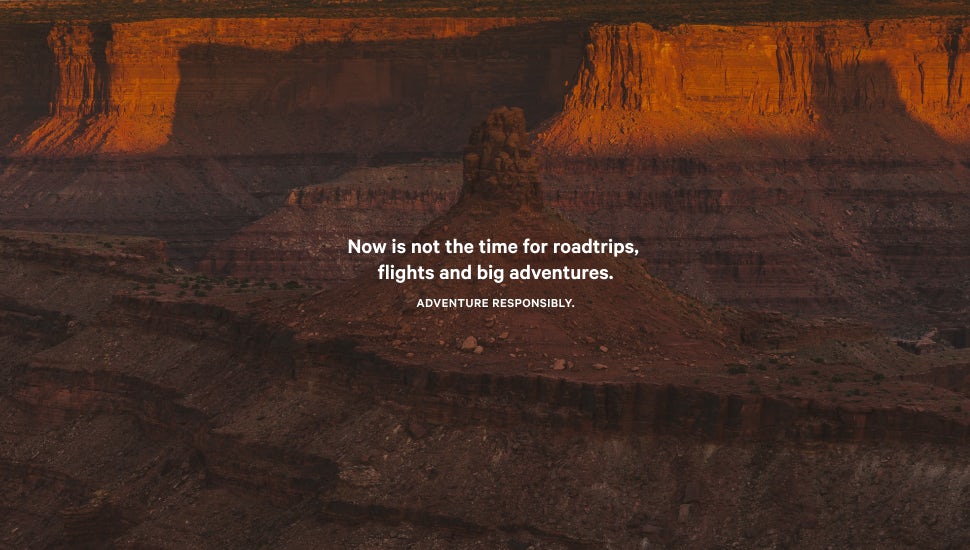How to Adventure Responsibly in the the time of Covid-19
Self isolating doesn't mean that you can't go outside. But it does mean you should make smart decisions -- both for yourself and more vulnerable people and communities.

I know many members of our community have a lot of questions about travel and the outdoors right now, so here are a few suggestions about how we're thinking about getting outside.
If you're looking for a few concise slides to share on your networks, you can download them here.
1. Avoid road trips and significant travel for now.
Cheap flights might be enticing, and social distancing by "hitting the road" can sound exciting, but we don’t want to put small communities at risk or increase our ability to spread infection. Even in the last few days, many people flocked to places like Moab and Tahoe to "just get away".
Most mountain towns and rural communities simply don't have the medical staff or facilities to handle an outbreak, and acting as a potential carrier simply isn't worth it. Heading out on a road trip and passing through small towns can have more of an affect than you think...you'll probably stop for gas (or to use the restroom), visit a grocery store, or interact with a parks service employee (if you're in a national park). Sure, it might be possible to limit your interactions, bring all your own food, and see no one. But honestly, most people aren't that self sufficient. Beyond the threat of spreading COVID-19, you also want to avoid putting an additional strain on rural healthcare systems if you suffer an accident while climbing, mountain biking, skiing, etc.
Additionally, some rural communities (like many in Utah) are already taking steps to actively prevent additional visitors during this time. Please respect that.
For those that are currently doing #vanlife full time...I honestly don't know. You're in a tough spot.
2. You don’t have to stop going outside
It’s great to get outside, take a break from the incessant news, and get away from social media, and many officials are even recommending it. But be aware of and minimize your "touch points" when going outside. Think home ➡️ car ➡️ trail (and reverse). Don't stray too far from home, avoid other people, and recognize any unnecessary risks that could put an additional burden on health professionals. Try and keep your groups limited to your own household.
National Parks can be a tantalizing option for many people right now, but recognize that they might also be a hotspot for crowds. Many park facilities will be closed and similar to a government shutdown, parks may not be prepared to manage visitors. If you do choose to go, don't use public facilities like restrooms, and consider sticking to areas you know are less popular.
A lot of people might not have the privilege of being able to use a car to create distance or access the more "backcountry" outdoors. In this case, walks down the street, in the park, etc are all still good options as long as you're maintaining at least 6 ft of space from others.
3. Listen to local officials and the CDC
Above all, follow the recommendations and restrictions of local governments and health officials. Wash your hands, practice social distancing, and keep yourself healthy.
It's a tough, complicated time right now
Many people are dealing with loss of work, trips being cancelled, or figuring out how to work from home. Events are cancelled, summer plans are in jeopardy, and our sphere of travel has narrowed to a radius around our house. But as with all challenges, this too shall pass. We can all handle staying at/closer to home for a while.
The mountains will still be there, there will be pow days next winter, and your health is more important than any trip -- as is the health of everyone in your community. While getting outside can and will be a key component for many people to reduce stress, relax, and get a bit of exercise, it's important that we do it in ways that don't put others at risk.
A few concise summary slides that you're welcome to share
They're all in a dropbox and you can download them here.
We want to acknowledge and thank the past, present, and future generations of all Native Nations and Indigenous Peoples whose ancestral lands we travel, explore, and play on. Always practice Leave No Trace ethics on your adventures and follow local regulations. Please explore responsibly!
Do you love the outdoors?
Yep, us too. That's why we send you the best local adventures, stories, and expert advice, right to your inbox.













